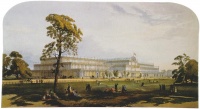Industrialisation
From The Art and Popular Culture Encyclopedia
| Revision as of 20:32, 29 July 2008 Jahsonic (Talk | contribs) (Industrialization moved to Industrialisation) ← Previous diff |
Current revision Jahsonic (Talk | contribs) |
||
| Line 1: | Line 1: | ||
| - | {{Template}}'''Industrialisation''' (also spelled '''Industrialization''') or an '''Industrial Revolution''' is a process of [[social]] and [[economic]] change whereby a human [[society]] is transformed from a pre-industrial (an economy where the amount of capital accumulated per capita is low) to an [[industry|industrial]] state (see [[Pre-industrial society]]). It is a part of wider [[modernization|modernisation]] process. This social and economic change is closely intertwined with [[technology|technological]] innovation, particularly the development of large-scale [[energy]] production and [[metallurgy]]. Industrialisation is also related to some form of [[philosophy|philosophical]] change, or to a different attitude in the perception of nature, though whether these philosophical changes are caused by industrialisation or vice-versa is subject to debate. The world's first industrialised city was [[Manchester]] in northwest [[England]]. | + | {| class="toccolours" style="float: left; margin-left: 1em; margin-right: 2em; font-size: 85%; background:#c6dbf7; color:black; width:30em; max-width: 40%;" cellspacing="5" |
| + | | style="text-align: left;" | | ||
| + | "[[Immanuel Wallerstein ]] characterised the [[World-systems theory |world system]] as a set of mechanisms, which redistributes [[surplus value]] from the ''[[Core–periphery structure|periphery]]'' to the ''[[core countries|core]]''. In his terminology, the ''core'' is the developed, [[Industrialisation |industrialized]] part of the world, and the ''periphery'' is the "[[Underdevelopment|underdeveloped]]", typically [[raw material]]s-exporting, poor part of the world; the ''[[market]]'' being the means by which the ''core'' [[exploitation|exploit]]s the ''periphery''." --Sholem Stein | ||
| + | |} | ||
| + | [[Image:The Crystal Palace.jpg|thumb|right|200px|A huge [[iron]] and [[glass]] building, [[The Crystal Palace]] was one of the [[wonder]]s of, if not the [[world]], [[United Kingdom|Britain]]. A rebuilt and expanded version of the building that originally housed the [[Great Exhibition]] of [[1851]], it stood in [[Sydenham]] from [[1854]] until [[1936]], and attracted many thousands of visitors from all levels of society. The name "Crystal Palace" was coined by the satirical magazine [[Punch magazine|Punch]]. Today, it symbolizes [[modern architecture]], the rise of [[consumer culture]] and the start of [[industrial design]].]] | ||
| + | {{Template}} | ||
| + | '''Industrialisation''' or '''industrialization''' is the period of social and economic change that transforms a human group from an [[agrarian society]] into an [[industrial society]], involving the extensive re-organisation of an [[economy]] for the purpose of [[manufacturing]]. | ||
| + | |||
| + | As industrial workers' incomes rise, markets for consumer goods and services of all kinds tend to expand and provide a further stimulus to industrial [[investment]] and [[economic growth]]. | ||
| + | |||
| + | ==See also== | ||
| + | * [[Automation]] | ||
| + | * [[Deindustrialization]] | ||
| + | * [[Division of labour]] | ||
| + | * [[Great Divergence]] | ||
| + | * [[Idea of Progress]] | ||
| + | * [[Mass production]] | ||
| + | * [[Mechanization]] | ||
| + | * [[Newly industrialized country|Newly industrialised country]] | ||
| {{GFDL}} | {{GFDL}} | ||
Current revision
|
"Immanuel Wallerstein characterised the world system as a set of mechanisms, which redistributes surplus value from the periphery to the core. In his terminology, the core is the developed, industrialized part of the world, and the periphery is the "underdeveloped", typically raw materials-exporting, poor part of the world; the market being the means by which the core exploits the periphery." --Sholem Stein |

|
Related e |
|
Featured: |
Industrialisation or industrialization is the period of social and economic change that transforms a human group from an agrarian society into an industrial society, involving the extensive re-organisation of an economy for the purpose of manufacturing.
As industrial workers' incomes rise, markets for consumer goods and services of all kinds tend to expand and provide a further stimulus to industrial investment and economic growth.
See also
- Automation
- Deindustrialization
- Division of labour
- Great Divergence
- Idea of Progress
- Mass production
- Mechanization
- Newly industrialised country

